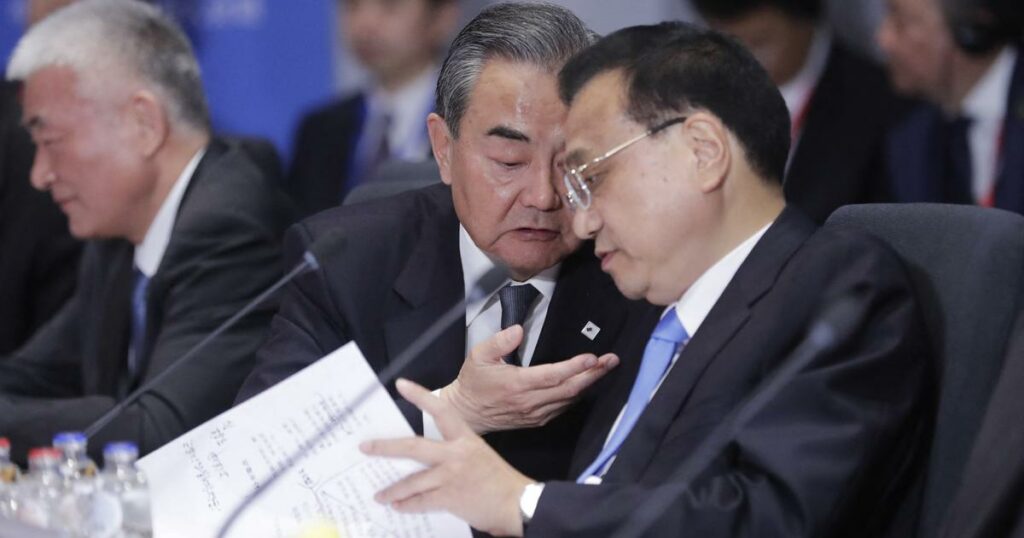Ten Pacific island nations on Monday rejected a sweeping China-proposed deal on regional security and economic development, fearing it would drag them into Beijing’s fold.
Read alsoAustralia calls on Pacific nations to avoid security deals with China
A virtual summit on greater diplomatic, economic and political cooperation between Beijing and regional countries appears to have failed, with some leaders expressing deep concern. « As always, we favored consensus« and he will have to be reached to sign everything »new regional agreement“, declared the co-organizer and Fijian Prime Minister Frank Bainimarama at the end of this meeting.
« A large developing country»
Wang Yi is in Suva, the capital of Fiji, as part of a ten-day tour of the region, as Beijing and Washington vie for influence in this strategic region. Before his arrival, Beijing proposed an agreement on how China intends to train their police, help them with cybersecurity, but also carry out mapping of the sensitive seabed and obtain better access to their maritime and terrestrial natural resources. . Beijing dangles millions of dollars in financial aid, the prospect of a free trade agreement with the China-Pacific islands and access to the vast Chinese market.
China presents itself as a « major developing countrywhich stands alongside small and medium-sized nations. Before the opening of this summit, Chinese President Xi Jinping sent a message, saying that his country would be « a nice brotherfor the region and that they shared a « common destiny“, according to the Chinese public television CCTV. In a letter to other leaders in the region, Federated States of Micronesia President David Panuelo called « fallacious» this proposed agreement intended to «ensure Chinese influence on the government » and the « economic control» key sectors.
“Common vision of development”
At the end of the meeting, the leaders made more moderate statements, declaring that they did not accept the « common development visionproposed by Beijing due to the lack of regional consensus. « As always, we favored consensussaid the summit’s co-organizer, Fijian Prime Minister Frank Bainimarama, after the meeting. Papua New Guinea, Samoa and the Federated States of Micronesia are among the countries that are concerned about these proposals, as well as Palau, which diplomatically recognizes Taiwan and was not invited to this meeting. « We prefer to deal with our own security issues with ChinaPapua New Guinean Foreign Minister Soroi Eoe told AFP, saying he was worried about a regional pact.
Chinese officials, who tried to secure support for the deal during Minister Wang Yi’s 10-day diplomatic offensive in the region, have admitted failure. « There was general support from all 10 countriesChinese Ambassador to Fiji Qian Bo said from Suva. « But of course there are some concerns on some specific issues and we have agreed that these (…) documents will be discussed further until we reach an agreement« .
Read alsoFacing China, European navies seek their way in the Indo-Pacific
“China will publish its own position”
After the meeting, which was held behind closed doors on Monday, Wang Yi did not mention the proposed document. He did, however, indicate that both partieswould continue to have continuous and in-depth discussions and consultations in order to build a broader consensus on cooperation« . « China will publish its own position« , which will evoke « our own positions and those of the Pacific island countries« , according to him.
Wang Yi, however, announced that the 10 island nations have reached MoUs on the New Silk Road and called for not worrying about Beijing’s designs. Many Western countries are annoyed by Beijing’s offensive, with the US State Department warning Pacific nations against these « opaque and vague chords with China. Australia joined the United States in urging China to stop expanding its security influence in the region. The nations of the Pacific remain concerned with maintaining good relations with China, finding the right balance between Beijing and Washington or even using it to play against each other.
While standing alongside the Chinese minister, the Fijian premier lashed out at those who engage in « race to score geopolitical points« . « It means nothing to anyone who is threatened by rising waters, who has lost their job due to the pandemic, or whose family is affected by rising prices for basic necessities.« . Most Pacific islands are low lying, which makes them particularly vulnerable to rising sea levels caused by climate change.
.

